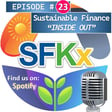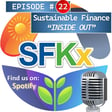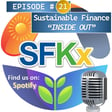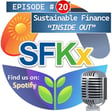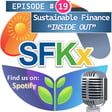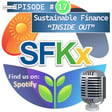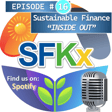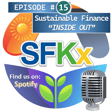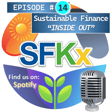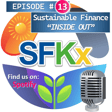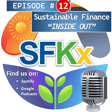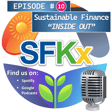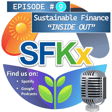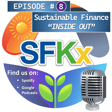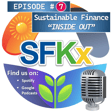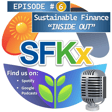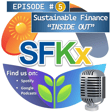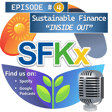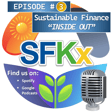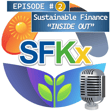Become a Creator today!Start creating today - Share your story with the world!
Start for free
00:00:00
00:00:01

Sustainable Finance Kx "Inside Out" Podcast Episode 11
Sustainable Finance Knowledge eXchange
We strive to bring you the critical news stories, events, major breakthroughs and key concepts covering the happenings in this super fast, evolving area of global finance – how the world funds the transition to Net Zero.
Think of us as a curator or sorts (much a like a museum or gallery that curates the finest paintings, sculptures, etc.) as we source only the best educational knowledge around Sustainable Finance worth sharing.
Transcript
Introduction and Host Welcome
00:00:14
Speaker
Hello and welcome to the 11th edition of the Sustainable Finance Inside Out podcast. You can catch us at Sustainable Finance KX on Twitter or X as they say now, sustainablefinancekx.com.
00:00:32
Speaker
and of course on your podcast platforms that you no doubt access. I'm SF Guru. SF DJ is still on holidays. We're looking forward to him coming back. So you're just with me today. So let's dive straight into it.
00:00:48
Speaker
and good morning, good evening, good afternoon, and any other salutation you would like to our listeners right across the globe. Unlike our last episode, I managed to get the funk music working, so hopefully that translates through to the start of another good episode.
Green Bonds and Market Trends
00:01:04
Speaker
So, what's been happening in the markets?
00:01:08
Speaker
One really good reference that we like to look at here at SFKX is the SEB or SEB Bank green bond report, which comes out about every couple of months. And there was just a bit of a recap from last year. And I don't think we'll really rehash any of that apart from we've said it a number of times on the podcast, flight to use of proceeds, flight to green,
00:01:34
Speaker
linked under pressure, loan formats heavily hit in the linked format, use of proceeds not much action on the use of proceeds side, at least in the public domain.
00:01:47
Speaker
In terms of greenwashing incidents by sector, there was a little report on that also by Seb looking at some rep risk data, looking at the main culprits around actually banking, what else we got utilities, food and beverage, oil and gas. So I think, you know, some of the claims may have reached at times right across a number of industries, nothing earth shattering there.
00:02:14
Speaker
In terms of issuers, like what we've said before on the podcast, really last year a flight to SSAs, sovereigns, multinational development or multi-jurisdictional development.
00:02:30
Speaker
development banks and a little bit off on the corporate side. If we then move through to have a look at what we're seeing across different sorts of issues, again, you're a pretty active CSDD. What that means for sustainable finance is more reporting have to be done. The more reporting that's being done, the more the banks can work with different products and hook sustainability aspects to lending and other banking
00:02:56
Speaker
banking services.
Energy Sector Updates
00:02:58
Speaker
Oil and gas climate action 100 came out with an update on oil and gas sector. Check that out. Not really, or we should say sobering reading, but it's a good framework to just make practical assessments about what's happening there. Methane continues to be an issue. Green hydrogen, almost every day you'd drown in news about that, which is all good stuff. Offshore wind still continuing to have some challenges around supply chains.
00:03:25
Speaker
around different markets and cost dynamics there. So let's see how that goes.
00:03:33
Speaker
In the last podcast, we also talked about the ongoing issue of avoided emissions and how they can be quantified and used in structures. More articles about that. A really good report again from the Texas, great research from that particular institution looking at CCUS from an economic perspective remains a costly technology to develop.
00:03:56
Speaker
lots of incentive support, blended finance instructions even to support and develop some of those projects globally. So do check that out if you're not signed up to some of their
00:04:08
Speaker
newsletters. Moving along again a couple of reports that have come out from MUFG which were found pretty useful as we talked about some sector highlights on the last podcast.
Global ESG Themes for 2024
00:04:18
Speaker
Now we'll talk about regional themes for 2024 as they've staggered out an ESG sort of report and outlook at MUFG and I think it's a good succinct to read so do check that out.
00:04:29
Speaker
Europe scaling the flagship green deal, UK slowing pace, a little bit political there about what the government is or isn't doing. USA is all about the inflation reduction act, scaling clean tech and ongoing subsidy programs there. China is in a new phase, transition finance, lots of ESG rules coming out around disclosures. India making more and more steps, pretty active on the hydrogen front, pretty active on the issuance front.
00:04:58
Speaker
as well. ASEAN, it's about just energy partnerships and regulations. MINA, or we should say the Middle East, doubling down on sustainability after a couple of cops in Egypt and Dubai. Latin America, all-round developments, Oceana.
00:05:14
Speaker
from piecemeal to cohesive in terms of transition progress regulations all sorts of things now so always good to look at what's happening in new zealand and au from best practice perspective africa growing voice and adaptation and financing and also particularly for the blended finance structures there
00:05:33
Speaker
Moving right along, I think we just talked about methane and Google's satellite. We may have even mentioned that in last podcast. Nature biodiversity continue to be key issues, reuse and recycling. Again, the EU looking to set new standards there. All of these things are really supportive of sustainable finance because the more reporting that's been done, the more standards that are set, we can look to support companies go beyond those standards or to support companies putting in CAPEX to support getting to
00:06:01
Speaker
and being able to meet those. AI is really going to become an interesting issue and no doubt be included in more use of proceeds aspects and maybe even linked aspects of sustainable finance. It's a pretty cool technology to help efficiencies. We know when you've got efficiencies, you drive down energy, efficiency, you drive down emissions, and then pinpoint agriculture, pinpoint manufacturing, lots of really cool things which we'll see come out there. So keep an eye
00:06:28
Speaker
on that sustainable supply chain continues, would probably sound like a broken record, to be an issue.
Sustainable Supply Chains
00:06:35
Speaker
I'll just read something that's come out of the EU in an era of increasing global environmental concerns. The significance of sustainable supply chains cannot be overstated in the pursuit of global decarbonisation. As business and industry strive to reduce their carbon footprint, adopting sustainable practices throughout the supply chain becomes a vital step towards achieving long-term environmental goals.
00:06:56
Speaker
And I really like what's happening in some developed markets about that because if you're in a non-developed market where the enabling regulations and shall we say disclosure infrastructure and requirements are less, you will get dragged into that through trading relationships. And I think that's a good thing.
00:07:14
Speaker
SAF, lots of articles about that, Southwest Airlines launching some venture investments into that area, Corseia, which is what the airlines need to do in terms of now formally moving into phase one after COVID in terms of buying credits, pretty high standards, not much supply that meet those standards, but again, having a great standard, having demand will help support that voluntary carbon market, or in this case,
00:07:40
Speaker
carbon credits that are required to to meet those coarsier stipulations for airlines. SCC again looking at or having released their climate disclosure rules and backtracking and forward tracking let's just keep an eye on them related to carbon credits like a CBAM the cross-border
00:08:01
Speaker
adjustment mechanism to account for carbon leakage if you're in Europe and you have to produce at a certain level and you're just importing a level of steel or other other type of an industrial equipment that has a very high embedded level of CO2 from another country leveling the play field. I guess it's an attempt to kind of fill in the dots of not having a global
00:08:26
Speaker
carbon price. So let's see how that develops. More articles about coal phase outs, particularly in Asia.
Carbon Credits and Compliance Markets
00:08:34
Speaker
There's a really good article or I should say report put out by the Nordic Group. It's a really good supplement to the ICMA guidance about use of proceeds reporting. The position paper on green bonds impact reporting. I think it's the third edition and do check that out because it's probably the best resource we've seen at scale in addition to ICMA.
00:08:55
Speaker
ocean biodiversity another sub theme really coming through on the on the trails of or in addition to the blue blue side of things what else have we got here um i think carbon credits we've already talked about a few of the issues there but i think what we're really going to see this year is
00:09:13
Speaker
more compliance markets start to integrate aspects of voluntary markets. We're seeing Corsair and then shipping being dragged into the limelight with different developments happening in those industries. We're going to see the market move to more capture rather than just forestry and base disclosure and claims. There's going to be more rules. Buyers will have more and more filters as
00:09:37
Speaker
quality is key but many other aspects social co-benefits permanence all sorts of things avoidance there's a there's an ongoing filtering process so hopefully all these issues swirling around with a focus on quality standards will really see a push towards more use of these instruments in a much bigger way in a way that we're
00:10:01
Speaker
much more understanding of them and they can happily hope make and accelerate a bigger difference. The Netzera Banking Alliance came out with some guidance I think a month or so ago and recording this podcast really encouraging things like not just financed emissions but facilitated emissions for bond type transactions so there's been a bit of pushback on those so do check them out but that's pretty interesting
00:10:27
Speaker
developments there, more regulations in the EU we've talked about, the SEC we've talked about, blurred lines between ESG and impact I think depends who you ask. ESG a much more sort of risk-based approach and not as pure from an impact perspective but all of those themes I think are good and they're under the banner of sustainability overall.
Emerging Themes: Nature Action and EU Laws
00:10:53
Speaker
what else we got in nature action 100 preparing to publish a benchmark for progress on nature that'll be super super good EU nature restoration law it's like
00:11:05
Speaker
nature and biodiversity keeps rearing our heads in terms of regulations, in terms of new developments, in terms of benchmarks, in terms of deals. So do keep an eye on that. What else should we go to here? SBTI or Science Based Target Initiative? I've copped a bit of
00:11:25
Speaker
criticism recently for their inclusion or what seems like the inclusion of carbon credits in a company's ability to mitigate their scope three or reduce their scope three emissions and in the quest to hit net zero. Let's see how that goes. There was a really good report
00:11:41
Speaker
which SPTI produced about automotive manufacturers and benchmarks there, so do check those, do check those. Greenwashing regulations, we're just going to keep seeing this. Greenwashing regulations for companies, what you can say, what you can't say. Greenwashing regulations for fund managers, what you can label, what you can't label.
00:12:00
Speaker
All sorts of good guidance for banks in terms of how to support customers do transactions, but obviously not go afoul on those regulations or misrepresent anything there.
Transition Loan Label Introduction
00:12:13
Speaker
Really interesting article we also saw was the LMA.
00:12:16
Speaker
the London Market Authority or Loan Market Authority, I believe, based in the EU's thinking about a transition loan label, which would be fantastic. I absolutely think that's what the market needs to rally behind to get some more consistency about what transition is, what it isn't. If we have some form of benchmark or consensus in a market standards, I think that'll really help develop and we'll see that get iterated.
00:12:41
Speaker
over many times. Taximania continues with a new addition or update we should say for the ASEAN taxonomy. I can't even say it anymore. In a really interesting article we also saw that the IRA legislation in the US which has provided a lot of subsidies have worked where taxonomies have not.
00:13:05
Speaker
And I guess what that article is really talking about is the definitions of green hydrogen and the greener it is or the lower emissions, it is the higher the subsidy. So these sorts of regulations and industrial rules are pretty important and they're right.
00:13:22
Speaker
Not necessarily a taxonomy is going to be usable in all cases or becomes a proxy taxonomy there. SLB step ups a long way from being punitive. Barclays come out with that. That's no great news in that. Sustainability link bond issuance limps into 2024. Yes, because of all the issues we've talked about.
00:13:45
Speaker
we've talked about before. Interestingly, we saw a development from Sustainable Fitch doing a transition assessment on a company called Obadrola, which is a pretty big renewables company over in Spain. But I think it's not necessarily the score that they gave that particular company was the actual assessment on the company rather than a transaction. So maybe we see a bit more of that before we get into labels sort of equity type instruments over time, but probably some
00:14:13
Speaker
probably some way off. What else have we got here in the news? Let's have a bit of a look. Climate bonds have come out with some pretty good report on companies and climate change, a bit of a report from different energy transition performance of autos, technology, electronics, key findings, those evidence that the Adjectors of Paris Agreement are being integrated to strategy of companies across sectors
00:14:42
Speaker
No great, nothing earth shattering there, considers the three dimensions of climate change mitigation adaptation and contribution to the transition to next zero. So some pretty interesting work that the Climate Bonds Institute have done that. Not a great summary I've just given you, but do check that out.
00:14:59
Speaker
One great report, which we will delve into, and probably one of the better things I've read for a number of months, if not years, is a Climate Bond Initiative have come out with a report on the SLB market for 2024. And most of what I'm about to say will relate to loans as well, maybe not exactly.
00:15:18
Speaker
Volumes have been pretty stagnant since the 2021 boom. Only sovereigns and local governments have increased volume since 23. Non-financial corporates dominate. Nothing earth-shattering there. To add credibility and unlock further scale and diversity, the core recommendation is the development
00:15:35
Speaker
and use of more guidance rules for SLB structuring and
SLB Market Structuring Needs
00:15:38
Speaker
disclosure. This can facilitate issuance while creating clear, higher and more consistent standards. So we've been talking about this for some time. There was a rush, it was a goldmine. Now everyone's pausing and trying to do better structured deals, more ambitious, but that's hard to do in the absence of benchmarks and in the absence of how we can look at, review, consider
00:16:00
Speaker
what is ambitious and you need a benchmark for that. What else have we got here? Some other finding. Most issuers, at least in the Bonsai, are reporting publicly on performance. Let's have a look. KPIs are generally selected according to the ICMA
00:16:24
Speaker
materiality matrix we should say and that's really based on a SAS SASB before it became the ISSB so do check that out if you're still wondering if a KPI first and foremost has to be connected to a material issue before any
00:16:42
Speaker
anything else. Most are still dominated by climate change, pretty much all industries, particularly utilities, which are the most active maritime for sure, aviation for sure, automotive for sure, probably the lowest
00:16:59
Speaker
number of incidents of using climate-focused KPIs was more from the health sector again still using those but not as much would be healthcare and let me have a look here a little bit on some water companies but a really good report breaking breaking all of those breaking all those down
00:17:21
Speaker
real mixture of whether Scope 3 was used. Material Scope 3 emissions often not covered. Lack of GHG targets is the main top reason for non-alignment by bonds and issue account in terms of getting into that CBI database. But the report looks at the whole market. So these themes, I'm telling you, again, are relevant for loans and just a broad snapshot
00:17:42
Speaker
of the market. A higher share of GHG-related KPIs is found to be off track versus other KPI categories. Not surprisingly, given 70-80% of KPIs chosen for these markets are GHG-based anyway. Let's just have a look at KPIs. KPI selection broadly reflects sector materiality, but far from perfect. Many sectors have little or no use of material KPI.
00:18:05
Speaker
climate mitigation KPIs dominate, KPIs related to climate adaptation are rare, excluding climate related KPIs, environmental KPIs are not more common than social or governance ones. We've probably seen some a little bit on water and a little bit on efficiency and some different aspects, energy efficiency and different aspects there. KPIs related to biodiversity cutting and say it are rare,
00:18:31
Speaker
What else have we got here? Among social themes, KPIs linked to diversity, equity, inclusion are probably the most common. And I was remiss of me to say that before, after GHGs, probably gender and some diversity metrics are the most common.
00:18:45
Speaker
Product governance KPIs were used significantly. They are most common KPIs after climate and large plot due to issue ratings and scores and things. Three themes were not absorbed at all air quality, just transition and data protection. So let's see if those are growing areas. I think just transition will be, but possibly some will start connected to use of proceeds more before we start adding linked aspects of those, because use of proceeds are often a good way to
00:19:15
Speaker
to start SLBs, issues and recommendations, best practice checklist, overall disclosures, GHG and mission targets and alignment with various benchmarks, important KPI selection around your scope threes, all those type of things. I think we'll skip through the rest of that apart from a couple of other things, multiple KPIs and targets again, you got to use one.
00:19:41
Speaker
often three, the first two are key ones and the third one may be not as strong. Call options for some type of hybrid type instruments, a bit of an issue, but as long as you call dates after when a bond has a measurement date, then that is fine. Post issuance, SLB reporting is key. Transition plans and link with SLB still really, really important.
00:20:10
Speaker
So if you look at it, user proceeds still really important from an eligibility point of view. Less so on strategy, becoming more important strategy. From a link perspective, strategy absolutely dominates in that bigger picture and linking your KPIs to that bigger picture and all about ambition. We've said that before, but no great surprise there.
00:20:31
Speaker
Okay, let's whip through a few transactions before we finish up. Thai Beverage, great transaction over there. Thailand, a really interesting market, reducing scope one and two emissions and renewable energy usage. Let's see, Palmore related intercontinental specialty fats. So check that one out in Malaysia. Trafficura on the commodity side, looking at scope one and two, some shipping aspects of scope
00:20:58
Speaker
scope three renewable power portfolio and implementation of some voluntary principles on security and human rights we'll see how that some of those qualitative
00:21:08
Speaker
KPIs can always be better, have more teeth, but again, really good way to start a company on that journey, to reward that project, reward that input, and then start to really put some teeth to it over time. So that's good stuff to see. Idly gas, scope one and two, emission reduction, women in leadership roles, strategic plans and other things. They're on the gas side.
00:21:34
Speaker
And then a mixture of property deals, renewables deals. What else have we got here? Construction materials, Votarum, so Mentos have been to the market a few times, SAPI on paper, and Forestry and ARCA on the consumer products. Moving right along, again, we're missing SFDJ a lot, and I'll have to take a breath at some point on the use of proceeds side of things. Again, banks continuing to really dominate
00:22:03
Speaker
activity there, but starting with the sovereigns, Iceland was active, Auckland Council's been the market a few times. Some pretty cool stuff always happening in New Zealand, so whenever you hear of a deal there, pretty generally well structured, generally very sustainable companies and a great market there.
00:22:21
Speaker
LGVX, which is or LGF, LGFVS. I've got no idea where that stands for, but it's a public sector financing vehicle in China on the Muni side, Council of Europe Development Bank on the supranational side doing sustainability bonds there. And then on the bank sides, you've had
00:22:42
Speaker
Banks in Turkey, Berlin, Hype, Equitable Bank, Banco Estado, Banco de Brazil, CIBC. I won't go through all of those. A couple of topical ones just to highlight. Emirates Nuclear Energy Corporation nuclear is here. Whether we like it or not, we need all the arsenal to reduce GHG emissions. And that's just now becoming more and more common, even new nuclear, not just refits only renewables, but remaining a key part of the market property.
00:23:12
Speaker
Oil and gas, this was a pretty interesting one, Pertamina, which is a big state-owned oil and gas company in Indonesia, coming out with a green bond, which is not common, at least a framework, I should say, which is not common overall for other oil and gas companies who prefer to go in linked format. So we'll see how that goes. More formats, more companies, different ways of attack transition, I think is a good thing.
00:23:36
Speaker
As long as that's robust renewables, transmission, clean transport, low carbon oils, I think, or low carbon products and those type of things. Amazon issued as well. We've seen some ports. Mao Ming port, I think, in China. Chengdu, Tianfu, in terms of an economic area.
00:23:59
Speaker
some chemicals on the back of Dow and Lanterman. Lanterman I mentioned here, just remembering I also talked about that last month. And then just a couple of other highlights here. What have we got? We've got renewables continuing to dominate, banks continuing to dominate Alcoa. I think we may have mentioned that in our last podcast. But again, showing how companies like Dow Chemical, Alcoa,
00:24:27
Speaker
A lot of companies that some people would call transition, opting in the green format and funding pretty close to transition type assets. And sometimes it's a bit of a blur. What matters is we're getting things issued, we're drawing narrative and highlights to the things that are getting financed and we keep expanding that market. But it would be great if LMA or ICMA or other institutions come out with some sort of transition financing principles would be excellent.
00:24:53
Speaker
A bit more property, a bit more banks. I'm just looking through my list here, a bit more on the muni side. So I think that probably takes us there. One thing I did notice was Inver Energy in the United States on the energy side doing some letters of credit in the green format presumably to source and import certain types of instruments for renewables projects, packaging,
00:25:17
Speaker
We've seen Agri a little bit, Kajidi Horos, and a little bit on the social side, but again, not much happening on the solely labeled social side of things, again, jammed into sustainability, related bonds, and you suppose it's for green and social. All right, couple of questions from Murray. I'm going to answer these
Blended Finance Explained
00:25:38
Speaker
super fast. What is blended finance? Question one, what is transition finance? Question two, question one, blended finance.
00:25:45
Speaker
There is principles in the market. You can check those out. I think OECD have come out with five or six principles for that. If you really want to understand, I think it's all about public and private working together.
00:25:59
Speaker
It's about public really de-risking something or taking a disproportionate amount of risk to crowd in private. It's about catalyzing that aspect and it's about having an impact focus. So it's about working together, whether it's a guarantee, whether it's an insurance instrument, whether it's a reserve account.
00:26:20
Speaker
whether it is first lost capital, whether it is an offtake, all these things that can be provided from public institutions, whether they're banks, governments or otherwise, crowding in private, really to get money to where it's not going.
00:26:35
Speaker
Well, stripping away all the fancy words, blended finance is about moving capital and money to where it's not going, using a variety of instruments and working with players in a different way to catalyze that, to crowd in that with an impact focus, not commercial for commercial sake. And it's not subsidizing commercial, purely commercial activities. There has to be an impact element, environmental element, social element to that.
00:27:00
Speaker
Okay, I'll take a breath.
Focus on Transition Finance
00:27:02
Speaker
What is transition finance? I think we always talk about transition. It's blurring a little bit in the market, but I'll give you an outtake here at SFKX. Transition finance is really company-wide or economic activity. And I think the market has said company-wide too vague. Let's focus on economic activities that focus on certain things to decarbonize that are generally on the dirtier side of things.
00:27:29
Speaker
So we know that maybe 10 to 20% of the economy is green, 80% is brown, moving to light brown. It's about covering that light brown to light green area.
00:27:40
Speaker
We can't just jump in many cases from a dirty industry or hard to abate sectors, which are generally the main actors or actresses, shall we say, in transition finance, your chemicals, your mining, your aluminium, your steel, your cement, your aviation shipping, really, really key industries that there's limited substitutes for, which are generally brown, heavily reliant on fossil fuels, heavily reliant on fossil fuels for their production pathways, and it's about dragging them closer to grain.
00:28:09
Speaker
And the real issue is on transition finance is how far do you need to drag? How many increments? One big leapfrog, half a leapfrog. And to what level is credible, dragging that away and towards green. That's what it's really about. And there's lots of market references for that. There's the IKMA.
00:28:26
Speaker
Transition finance, I can't even remember now, climate transition finance principles, which are more about strategy and transition finance, similar to SLBs is absolutely key around having a transition plan and a good strategy. Also, what are you financing?
00:28:43
Speaker
Does it have some research behind it? Does it make a substantial contribution towards decarbonization? Transition finance still focused about decarbonization, less so around just transition and other types of things. So hopefully that analogy of moving from brown to light brown to light green and in that sort of space of should we not do it? And challenging ourselves on those questions, that's what it's all about. Okay, a couple more things before we finish up on products and programs. Agri-Land,
00:29:12
Speaker
on the dairy goal, Bank of Ireland launching some sustainability loans for suppliers. Good stuff there. I think that's on the milk side. RBC in terms of decarbonisation activities in their framework and expanding those out for more hard to abate sectors, similar to what I've just said on the transition finance side of things.
00:29:31
Speaker
you're really going to see more banks come out with expanded types of frameworks to set the scene and attract more customers in terms of what they're willing to finance. We've seen Barclays do that. We've seen SMBC do that. We've seen Standard Chartered do that. We've seen DBS do that. And more recently, the latest one is RBC expanding out to really these hard to abate sectors. And is it the transition activity about
00:29:59
Speaker
carbon capture? Is it about hydrogen? Is it about energy efficiency still connected to very much connected to a fossil fuel-reliant pathway? Or what else it may be? So do look out for those. The more we see, the more they will seed and support sustainable, I should say this transition branch of the overall
00:30:21
Speaker
sustainable finance branches and that can only be a good thing. If we don't ever label and we don't ever shout about those transactions, the market's not going to grow as much as we want. We need debate for growth.
00:30:35
Speaker
So that's all I've got time for today. We hope you like the latest edition of our podcast. We're really missing SFGJ and hopefully he's back for the next episode. As we've said before, check us out at SustainableFinanceKX.com on X or Twitter at Sust Finance KX or LinkedIn. You can also check us out as well, Sustainable Finance KX. So from me, and I should say from him, although he's not here, SFGuru, me and SFGJ,
00:31:02
Speaker
Goodbye and we'll see you next time and I'm going to try and play this music and see you later.
